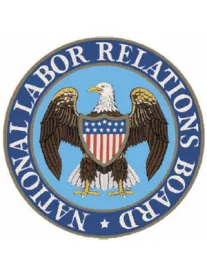In a refreshing decision for employers, the D.C. Circuit Court of Appeals earlier this month tossed an eyebrow-raising NLRB decision which permitted AT&T customer-facing and publicly visible technicians to wear faux prison garb in customers’ homes and in public. Writing for a unanimous panel in Southern New England Telephone Company v. NLRB, Judge Brett Kavanaugh’s introduction is sure to earn rave reviews from employers.
Rather than paraphrase, Judge Kavanaugh opened:
Common sense sometimes matters in resolving legal disputes. This case is a good example. AT&T Connecticut banned employees who interact with customers or work in public – including employees who enter customers’ homes – from wearing union shirts that said “Inmate” on the front and “Prisoner of AT$T” on the back. Seems reasonable. No company, at least one that is interested in keeping its customers, presumably wants its employees walking into people’s homes wearing shirts that say “Inmate” and “Prisoner.”
To add a bit more detail, the union representing the employees distributed the “prisoner” T-shirts to its members as part of a public campaign to pressure AT&T during contentious contract negotiations. The T-shirts, however, contained no reference to the union or to the ongoing labor dispute. The union encouraged employees to wear the “prisoner” shirts to work, and hundreds of employees did so. Each day, AT&T supervisors directed all technicians who interacted with customers or worked in public to remove the “prisoner” shirt. AT&T issued one-day suspensions to 183 employees who did not comply. AT&T officials testified that the T-shirts could alarm or confuse customers, could cause customers to believe that AT&T employees were actually convicts, or could harm the company’s public image more generally.
Publicly visible employees must adhere to AT&T’s appearance standards, which require a professional appearance and prohibit clothing with printing or logos that are unprofessional or will jeopardize AT&T’s reputation. Nonetheless, in previous years, several AT&T employees wore shirts printed with questionable messages and allegedly were not disciplined for doing so. Those examples, too good to omit here, included the following classics:
“The liver is evil. It must be punished”;
“I’m not drunk. I’m just a race fan”;
“If I want your opinion … I’ll take the tape off your mouth!”; and
“Out Of Beer. Life Is Crap.”
An administrative law judge decided that AT&T’s prohibition of the T-shirts violated Section 7 of the National Labor Relations Act, which protects the right of employees to wear union apparel at work. In a divided 2-1 decision, the NLRB affirmed the ALJ’s conclusion, finding that the “prisoner” shirt “would not have been reasonably mistaken for prison garb” and that “the totality of the circumstances would make it clear” that a technician wearing the shirt was an AT&T employee “and not a convict.” In reaching their decisions, the ALJ and the NLRB discounted what is known as the “special circumstances” exception to the general rule about union apparel at work. That is, an employer may lawfully prohibit its employees from displaying messages on the job that the company reasonably believes may harm its relationship with its customers or its public image.
Taking a shot at the NLRB, the D.C. Circuit cited one of its previous decisions, which remarked: “[T]he Board’s ‘expertise is surely not at its peak in the realm of employer-customer relations.’” The Court dismissed the NLRB’s argument that AT&T did not enforce its ban on unprofessional clothing in an evenhanded way (allowing other questionable shirts to be worn while banning the “prisoner” shirt) by explaining that the other questionable shirts – though shedding light on some of the vices of the workforce – “were not nearly as problematic as the one at issue here, or at least a reasonable employer could so conclude.” Additionally, the Court noted that “no case holds that a company that on some occasions has allowed unprofessional clothing to be worn by employees is somehow estopped from prohibiting other unprofessional clothing.”
This case (as it should have been) was a simple one for the Court. Judge Kavanaugh observed: “To resolve this case, it is enough to ask the question, as [NLRB] Member Hayes did in dissent: ‘What would you think about a company that permitted its technicians to wear such shirts when making home service calls?’” Given that framework, and “given the straightforward evidence that AT&T introduced of the shirt’s message and the circumstances under which customers interact with or can see employees wearing the shirt,” the DC Circuit ruled that “the Board should have held that ‘special circumstances’ applied here.”
The takeaway is that, while employers should recognize that the NLRB will likely continue to bend over backwards to protect employee rights (common sense notwithstanding), courts are beginning to push back, looking at the business realities that employers face. So employers can take some comfort in their decisions to prohibit customer-facing and publicly visible employees from wearing particularly offensive gear (e.g., prison garb) that they reasonably believe may harm their customer relationships or their public image.



 />i
/>i
